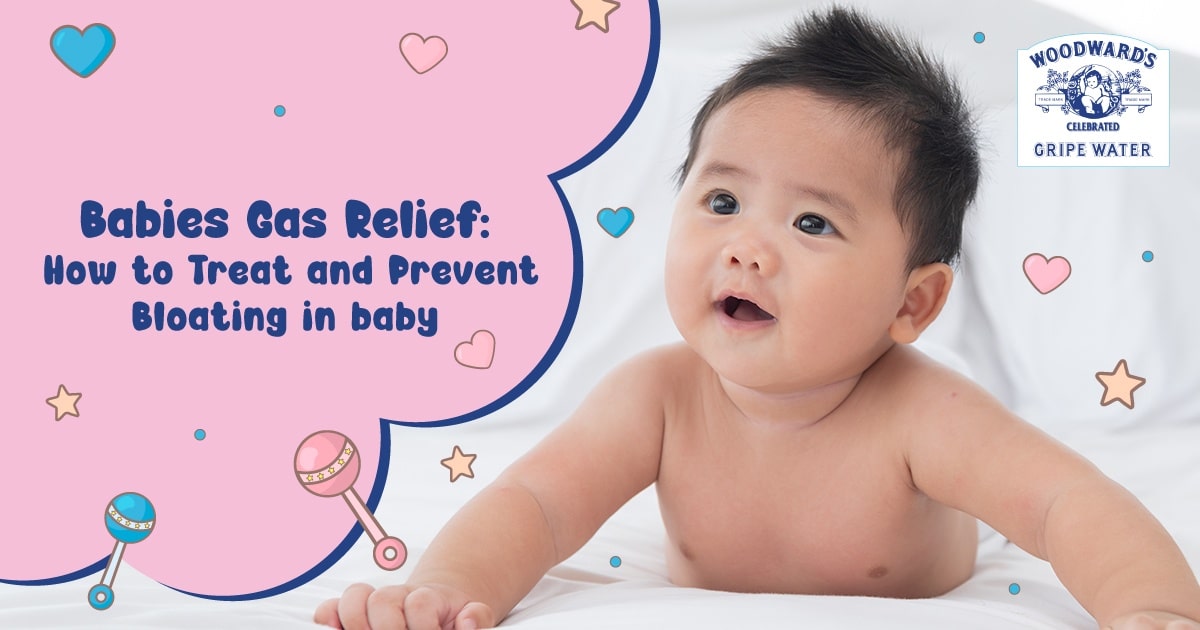Babies Gas Relief: How to Treat and Prevent Bloating in baby

Introduction
Bloating in baby is a common occurrence, with babies typically passing gas around 13 to 21 times a day. While it may be concerning for parents to see their little ones with bloated bellies, it is usually not a cause for alarm. Gas is particularly prevalent in babies between one and four months old, as their digestive systems are still developing. In this blog article, we will explore the reasons why babies get bloated bellies and provide helpful tips on how to treat and prevent this discomfort.
Why do babies get bloated bellies?
There are several factors that can contribute to a gassy baby. Babies often swallow air when they cry, suck on pacifiers, or during feeding. The position in which a baby is fed can also lead to excess air intake, as well as overfeeding or constipation. Understanding the root causes of bloating in baby is essential in finding the most effective solutions.
How to Deal with a Bloating in babies?
Dealing with a bloated baby belly can be challenging, especially for new parents. However, there are various strategies you can employ to provide relief to your little one and ease their discomfort. Let’s explore some of these techniques:
Be Careful of Your Baby’s Diet
Breastfed babies may experience gas if their mothers consume certain foods that cause bloating, such as beans, broccoli, or cabbage. If you notice that your baby becomes gassy after you consume these foods, try eliminating them from your diet for a few days to see if their symptoms improve. For formula-fed babies, switching to a different type of formula may help alleviate gas. Speak to your pediatrician for recommendations on formulas that are gentler on the digestive system.
Switch up the Equipment
Sometimes, the equipment you are using to feed your baby can contribute to their gassiness. If you are bottle-feeding, trying a different type of bottle and nipple combination could be beneficial. Experts recommend using soft nipples that contour along with the baby’s mouth and lips, as this can prevent any accidental flows of air when the baby is eating. Additionally, ensuring that the bottle is tilted at an angle that minimizes air intake can also be helpful.
Burp the Baby Regularly
Burping your baby during and after feeding can significantly reduce gas buildup. It is recommended to burp your baby every two to three ounces if you are bottle-feeding, or whenever they switch breasts if you are breastfeeding. There are different burping techniques you can try, such as:
-
- Sitting upright and holding your infant against your chest. In this position, your baby’s chin will be on your shoulder while you support them with your hand. Gently pat your baby on the back.
- Holding your infant sitting up across your knee or in your lap. Support your baby’s head with one hand while holding their chin. With the heel of your other hand on your baby’s chest, pat their back gently.
- Laying your baby face down on your lap. Make sure their head is higher than their chest and support it with your hand. Pat their back gently.
Give Woodward’s Gripe Water to the Babies
Woodward’s Gripe Water is a popular remedy for relieving gas and colic in babies. Made with an ayurvedic formulation of like dill seed and sarjikakshara, it can provide quick relief to a bloated baby belly. However, it is essential to consult with your pediatrician before giving any over-the-counter remedies to your baby. By implementing these strategies, you can help your baby find relief from their bloated belly and promote a more comfortable digestive system.
Conclusion
A bloated baby belly due to gas is a common occurrence in babies, particularly between the ages of one and four months. While it may cause discomfort, there are various ways to treat and prevent this issue. By being mindful of your baby’s diet, switching up feeding equipment, burping regularly, and considering natural remedies like Woodward’s Gripe Water, you can help alleviate their discomfort and promote a healthy digestive system. Remember, if you have any concerns or the symptoms persist, always consult with your pediatrician for further guidance.
